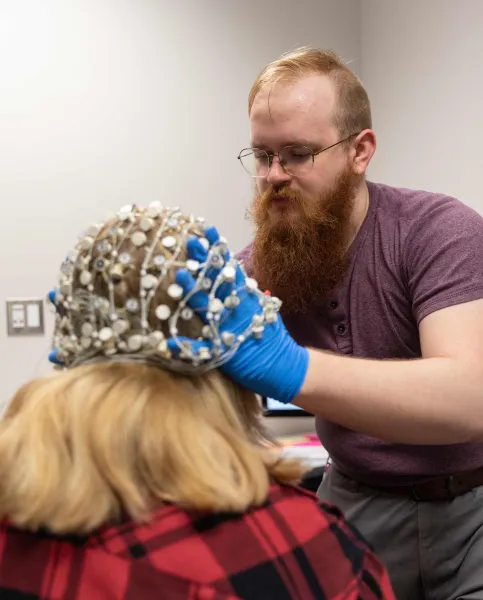Northern Michigan University's Department of Psychological Science has received a $413,000 National Science Foundation Major Research Instrumentation award to facilitate a new frontier in human neuroscience research that could transform the field. NMU will use the funds to acquire an integrated system that assesses the cause-and-effect brain-behavior relationships underlying social interactions and other aspects of human behavior, which could have implications for those with depression, anxiety or addiction disorders.
The instrumentation will also provide critical training opportunities for undergraduate students in emergent techniques and enhance the broader research environment on campus.
Psychological Science had previously worked with an electroencephalogram (EEG) system with 64 electrodes that can be positioned on the scalp to record electrical activity emitted by the brain. With the NSF award, NMU will acquire two high-density EEG systems with 256 electrodes each.
“We'll be able to increase the number of electrode locations across the head to more accurately pinpoint the source of electrical signals in the brain,” said Professor Joshua Carlson, principle investigator of the NSF award. “In addition to recording brain activity, each electrode is also capable of emitting a small electrical current through high-density transcranial electric stimulation. That allows us to essentially reverse engineer the process and send a signal back to the same source and stimulate that area of the brain to see how it affects behavior. It's a temporary, non-invasive manipulation with no adverse effects.”
Faculty and student researchers will also be able to synchronize the two 256-electrode EEG devices with each other to allow for hyperscanning, which provides insight into the neural mechanisms underlying social situations. Data can be collected from both devices at the same time to determine how one brain is playing off another while two people are interacting. Not all experiments with the equipment will involve this aspect, but Carlson said the potential to manipulate brain activity with high precision and assess a causal link to human behavior was the department's main rationale for acquiring the integrated system.
“Undergraduate students at Northern have been fortunate to work with our existing 64-channel EEG system; that's not typical at many universities,” Carlson said. “This new instrumentation will be a big step up from that. Our plan is to continue including undergrads in the process of collecting and analyzing data to gain experience, leading to opportunities for greater responsibility. NSF awards are highly competitive. There are about 25 labs worldwide with this integrated system, but when it comes to primarily undergraduate institutions, Northern is probably the first. It will be a great recruiting tool for students and faculty.”
EEG-based measures of reward processing, during which the brain associates diverse stimuli such as activities, substances or situations with a positive outcome, have been extensively studied in the context of adaptive and maladaptive behavior. But the underlying neural generator of these reward-based EEG signals remains a point of contention. The instrumentation supported by the NSF award provides a unique opportunity to stimulate potential neural generators and assess the causal effects of that modulation on EEG measures of reward processing in multiple contexts. The contexts include simple gambling tasks; cognitive training protocols that refocus attention on the positive; and simulations of the addiction relapse process.
“We bring in participants and put them through a simulation designed to get a relapse to occur within the session,” said assistant professor Cory Toegel. “We're trying to figure out what's going on in the brain and how to alter that. Can we enhance or inhibit relapse from happening in first place? This instrumentation really escalates our research because in no way were we looking at the brain previously. It will be valuable to our lab and starts a collaboration with other labs.”
Future studies will explore the extent to which high-density transcranial electric stimulation (HD-tES) targeting of sources for reward processing and performance monitoring—the ability to learn from successes and failures—can be used to alter intrinsic motivation and cooperation, along with task performance, in cooperative vs. competitive social interactions.
The integrated system is expected to be delivered to campus late this semester. Other psychological science faculty who will use it for research and are co-investigators on the award are Lin Fang, Jon Barch, Cory Toegel and Forrest Toegel. The department hopes to utilize the instrumentation in some courses, hold informal brown bags to discuss research ideas and related articles about the system, and recruit faculty from other disciplines who might benefit from the technology.

